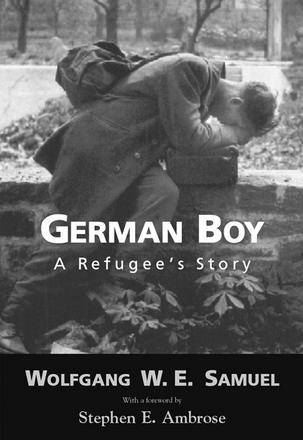
German Boy
A Refugee’s Story
A refugee child’s witness to Nazi defeat, Soviet occupation, and his family’s debacle in war
Description
What was the experience of war for a child in bombed and ravaged Germany? In this memoir, the voice of innocence is heard.
“This is great stuff,” exclaims Stephen E. Ambrose. “I love this book. ”
In this gripping account, a boy and his mother are wrenched from their tranquil lives to forge a path through the storm of war and the rubble of its aftermath. In the past there has been a spectrum of books and films that share other German World War II experiences. However, told from the perspective of a ten-year-old, this book is rare. The boy and his mother must prevail over hunger and despair, or die.
In the Third Reich, young Wolfgang Samuel and his family are content but alone. The father, a Luftwaffe officer, is away fighting the Allies in the West. In 1945 as Berlin and nearby communities crumble, young Wolfgang, his mother Hedy, and little sister Ingrid flee the advancing Russian army. They have no inkling of the chaos ahead. In Strasburg, a small town north of Berlin where they find refuge, Wolfgang begins to comprehend the evils the Nazi regime brought to Germany. As the Reich collapses, mother, son, and daughter flee again just ahead of the Russian charge.
In the chaos of defeat they struggle to find food and shelter. Death stalks the primitive camps that are their temporary havens, and the child becomes the family provider. Under the crushing responsibility, Wolfgang becomes his mother’s and sister’s mainstay. When they return to Strasburg, the Communists in control are as brutal as the Nazis. In the violent atmosphere of arbitrary arrest, rape, hunger, and fear, the boy and his mother persist. Pursued by Communist police through a fierce blizzard, they escape to the West, but even in the English zone, the constant search for food, warmth, and shelter dominates their lives, and the mother’s sacrifices become the boy’s nightmares.
Although this is a time of deepest despair, Wolfgang hangs on to the thinnest thread of hope. In June 1948 with the arrival of the Americans flying the Berlin Airlift, Wolfgang begins a new journey.
Reviews
"An engrossing and powerful narrative"
- Publishers Weekly
"There is a thread of hope, an appreciation for random kindness, and an ability to look beyond the depravity of humankind that pervades this brave and poignant memoir"
- Cynthia J. Rieben, W. T. Woodson High School, Fairfax, VA, School Library Journal
"It is hard to imagine that Samuel, as a boy, struggled to translate 'Hast Du genug fur Heute?' ('Do you have enough food for today?') into English--for now his prose sings. "
- Kirkus Reviews
"This deeply emotional and moving memoir clearly illustrates that the military collapse of Nazi Germany was eclipsed by the greater tragedy of the German nation. "
- Library Journal
"We get a compelling child's-eye view of the European conflict in German Boy. . . . Wolfgang W. E. Samuel, an immigrant to the United States, was a child in Nazi Germany. Samuel recounts how the war cast his family out of their home and tells of the many hardships it exacted afterward. Samuel's aunt and cousin were raped, and his mother prostituted herself to keep Samuel and his sister alive. . . . Throughout his narrative, Samuel exhibits a remarkable fidelity to the perceptions and voice of his younger self. As a child, he asks questions about the war that adults have difficulty answering. He forces them to examine their prejudices and rationalizations and look at the war for what it is. . . . German Boy is also a testament to human adaptability and the survival instinct. "
- Washington Post Book World
"A compelling memoir of what it was like to become a refugee overnight and to remain one for six years. . . . German Boy [embodies] the ever-recurring historical truth that the innocent usually pay for the sins committed by others. "
- New York Times Book Review
"Samuel's description of his family's escape to the West is both thrilling and terrifying. This is an absorbing story of survival and redemption. "
- Booklist